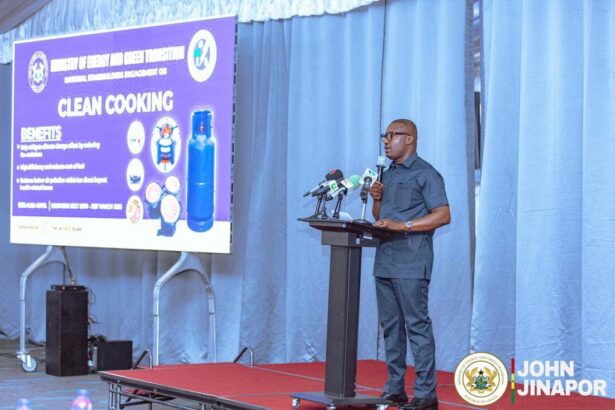The Ministry of Energy and Green Transition has held a two-day National Clean Cooking Policy and Strategy Workshop to tackle public health concerns and environmental degradation.
The event brought together a diverse group of stakeholders, including policy experts, industry leaders, and development partners, marking a significant step in Ghana’s efforts to promote clean cooking solutions.
Delivering the keynote address, Minister for Energy and Green Transition, John Abdulai Jinapor, highlighted the substantial challenges of household cooking in Ghana, where nearly 60% of the population relies on traditional solid fuels such as charcoal and firewood.
He noted that this dependence leads to approximately 6,500 deaths annually due to household air pollution, with children under five being particularly vulnerable.
He stressed the socio-economic toll of inefficient cooking methods, particularly on women and children, who face the burdens of fuel collection and health risks.
To address these issues, the Ministry introduced the proposed National Clean Cooking Policy (NCCP), which aims to establish a structured framework for promoting clean cooking solutions across the country.
The policy will support a diversified clean cooking energy mix, including Liquefied Petroleum Gas (LPG), electric stoves, biogas, and improved biomass cookstoves.
Mr Jinapor explained that the NCCP would provide regulatory and fiscal incentives to boost investment in the sector and support local industry development to ensure the affordability and availability of clean cooking technologies.
He also emphasised the need for public awareness campaigns to drive behavioural change toward cleaner cooking solutions.
The Minister further announced the revision of the National Clean Cooking Strategy (NCCS) and the accompanying Investment Prospectus (IP), which will outline a clear roadmap for implementation.
These documents will define stakeholder roles, responsibilities, and the financial resources required to scale up clean cooking adoption.
He urged participants at the workshop to engage in meaningful discussions and offer innovative solutions that move Ghana from policy formulation to tangible action.
“Achieving universal access to clean cooking is not solely the responsibility of the government; it requires a collaborative, multi-stakeholder approach,” he stated.
source: 3news



